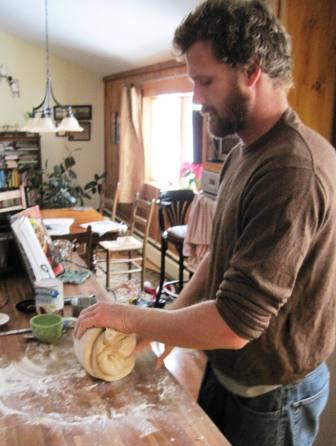
- Difficult children eventually grow up and become interesting. I have many “Ian” stories because he was so challenging. He was the third child born in 3.5 years, and has a younger sister. Ian is making pizza dough here. Making pizza together on Friday nights and watching a movie together was one of our family traditions.
I can still see Ian, above, then 17 years old, standing in the kitchen, looking down at me from his 6’2″ height, arguing in a tortured voice.
Ian: “Why do I have to eat family dinner?”
Me: “You must have dinner with us tonight.”
Ian: “It’s stupid.” Shakes hands and shoulders. Sighs.
Me: “It will only take 20 minutes. Then you can go out with your friends.” Some things are non-negotiable. Every fiber of my being sent the message that I was not going to budge from this expectation.
Ian: “I don’t see why I must have family dinner.” I give him the last word. No worries. He came to family dinner and got a dose of connection, values and love.
The primary reason to have family dinner:
Research shows that regular family dinner (breakfast works, too) three or more times a week results in lower use of drugs, alcohol and cigarettes among teens and tweens.
Family dinner interrupts the time between 2 pm school dismissal and midnight, when junior operators must be off the road. So it limits the distance and trouble they can get into.
The worst trouble one of our teens ever got into was when that teen should have been home for family dinner. Bob and I had become permissive. We immediately got back on the family dinner track.
Our family made pizza together on many Friday nights and watched a G or PG-rated movie together. Everyone put toppings of their choice on a small pizza. By middle school, they could make and roll out the dough so it was a team effort. We all pitched in to clean up. My “kids” request pizza when they come home to visit and we share an enjoyable family dinner.
And Ian? When he celebrated his 26th birthday a few months ago, do you know what he served for a bunch of friends? A dozen homemade pizzas. As they devoured the delicious gourmet pizza, friends commented, “You MADE this? Man, this is really good!”
Get some pizza pans. Connect to your kids. Look how fast they’ve grown already. They will leave home — and this will make you happy. Family dinner reduces the likelihood they will stray towards drugs, alcohol and cigarettes. This will make you happier.



